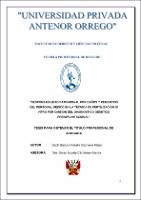Mostrar el registro sencillo del ítem
Responsabilidad patrimonial por daños y perjuicios del personal médico en la técnica de fertilización in vitro por omisión del diagnóstico genético preimplantación
| dc.contributor.advisor | Cardenas Garcia Betsy Sucety | |
| dc.contributor.author | Gamarra Mejia, Sandra Natalia | |
| dc.creator | Gamarra Mejia, Sandra Natalia | |
| dc.date.accessioned | 2017-01-26T20:20:26Z | |
| dc.date.available | 2017-01-26T20:20:26Z | |
| dc.date.issued | 2017 | |
| dc.identifier.uri | https://hdl.handle.net/20.500.12759/2256 | |
| dc.description.abstract | Existen muchas parejas en la actualidad que se encuentran biológicamente imposibilitadas de poder tener un hijo, debido a problemas de infertilidad ya sea por parte de uno o si son ambos los que de forma natural no pueden si no es con ayuda médica solucionar su problema. Lo relacionado al tema antes mencionado tiene diversos puntos de vista y es a su vez complejo, afectando aproximadamente noventa y cuatro millones de personas en el mundo .El avance de la ciencia y tecnología facilitan la reproducción humana con las llamadas TERAS (Técnicas de Reproducción Asistida), con éstas, la fecundación es enteramente realizada por el médico especialista en un laboratorio, donde tal es el todopoderoso para crear una nueva vida; Es así que estas parejas , tienen que recurrir a alguna de las técnicas aceptadas en nuestra legislación para poder llevar a cabo la formación del fin de las mismas , el cual es formar su familia ; pero no siempre los procedimientos ante los cuales estas acceden son manejados de forma adecuada para conseguir la finalidad deseada debido a que ante un determinado hecho en donde la responsabilidad del médico y del personal especializado al igual que la responsabilidad del establecimiento asistencial, van a suponer una responsabilidad civil derivada de manera contractual o extracontractual , siendo la que nos interesa en este caso la primera en mención ; esto se va a dar como consecuencia del incumplimiento de una obligación nacida de la celebración voluntaria de un contrato de asistencia médica cuyo objetivo es la aplicación de la técnica de fecundación asistida(para la presente investigación, la técnica de Fertilización In Vitro ) al ser evidente que el concebido creado por la aplicación de la misma sufre un daño genético, que en este caso como es obvio sería no hereditario, sino consecuencia de la mala aplicación de la técnica en general resultando claro, en consecuencia, que en este supuesto de transmisión de la vida por fecundación asistida la responsabilidad civil es resultante del incumplimiento de una obligación pactada. | es_PE |
| dc.description.abstract | Many couples today are biologically unable to have a child of due to infertility problems either by one or both of which are naturally cannot except with medical help solve your problem. Matters related to the subject aforementioned has different views and his complex time, affecting approximately ninety-four million people in the world .The advancement of science and technology facilitate human reproduction with TERAS calls (Assisted Reproduction Techniques ), with the latter, fertilization is entirely done by the specialist doctor in a lab, where such is the almighty to create a new life; It is so these couples have to resort to any of the accepted techniques in our legislation to carry out the formation of the end thereof, which is to form his family; but not always the proceedings in which such access are handled properly to achieve the desired purpose because before a particular event where the responsibility of the physician and specialized personnel as well as the responsibility of the care facility, will make an contractual civil liability or tort, being the one that interests us in this case the first mention; this is going to give as a result of a breach of an obligation of voluntary holding a healthcare contract obligation whose purpose is the application of the technique of assisted fertilization (for this research, the technique of IVF) to be evident the designed created by the application of it suffers genetic damage, which in this case obviously would not hereditary, but the consequence of the misapplication of the technique in general becoming clear, therefore, that in this case transmission life by assisted fertilization is liability resulting from breach of an agreed obligation product mishandling or omission of any step in the process of creating life itself. In this way medical negligence caused by the specialists who engage in such contractual liability to act will give either by not examining the germ components used in the art, if he lacked expertise in the delivery of technical or he committed another act either fraudulent or culpable, must respond and restore the damage caused, either the child or the mother. In addition, the physician has the responsibility to verify the qualifications and requirements of couples who have to apply the process; | en_US |
| dc.description.uri | Tesis | es_PE |
| dc.format | application/pdf | |
| dc.language.iso | spa | es_PE |
| dc.publisher | Universidad Privada Antenor Orrego | es_PE |
| dc.relation.ispartofseries | T_DER_310 | |
| dc.rights | info:eu-repo/semantics/openAccess | es_PE |
| dc.rights.uri | https://creativecommons.org/licenses/by/4.0/ | |
| dc.source | Universidad Privada Antenor Orrego | es_PE |
| dc.source | Repositorio Institucional - UPAO | es_PE |
| dc.subject | Técnica de fertilización in vitro | es_PE |
| dc.subject | Responsablidad patrimonial | es_PE |
| dc.title | Responsabilidad patrimonial por daños y perjuicios del personal médico en la técnica de fertilización in vitro por omisión del diagnóstico genético preimplantación | es_PE |
| dc.type | info:eu-repo/semantics/bachelorThesis | es_PE |
| thesis.degree.level | Título Profesional | es_PE |
| thesis.degree.grantor | Universidad Privada Antenor Orrego. Facultad de Derecho y Ciencias Políticas | es_PE |
| thesis.degree.name | Abogado | es_PE |
| thesis.degree.discipline | Derecho | es_PE |
| dc.publisher.country | PE |
Ficheros en el ítem
Este ítem aparece en la(s) siguiente(s) colección(es)
-
Derecho [442]


